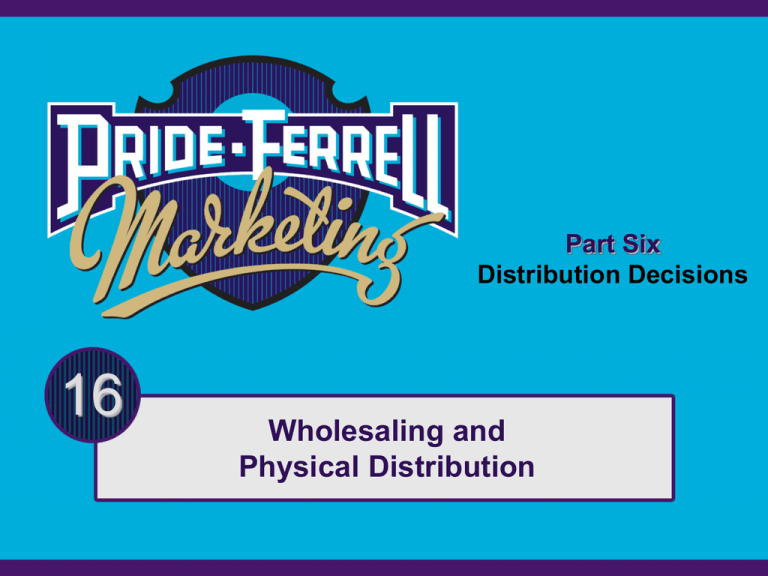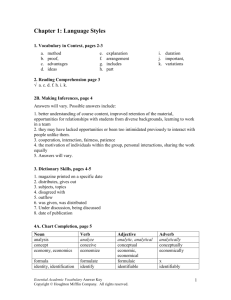
Part Six
Distribution Decisions
16
Wholesaling and
Physical Distribution
Objectives
1. To understand the nature of
wholesaling in the marketing channel
2. To explain wholesalers’ functions
3. To understand how wholesalers are
classified
4. To recognize how physical distribution
activities are integrated into marketing
channels and overall marketing
strategies
Copyright © Houghton Mifflin Company. All rights reserved.
16 | 2
Objectives
5. To examine the major physical
distribution functions of order
processing, inventory management,
materials handling, warehousing, and
transportation
6. To discuss the strategic implications of
physical distribution systems
Copyright © Houghton Mifflin Company. All rights reserved.
16 | 3
Chapter Outline
•
•
•
•
•
The Nature of Wholesaling
Types of Wholesalers
The Nature of Physical Distribution
Functions of Physical Distribution
Strategic Issues in Distribution
Copyright © Houghton Mifflin Company. All rights reserved.
16 | 4
The Nature of Wholesaling
• Wholesaling
– Transactions in which products
are bought for resale, for
making other products, or for
general business operations
• Wholesaler
– An individual or organization
that facilitates and expedites
wholesale transactions
• Handles the physical distribution of goods
• Furnishes channel information to facilitate and manage
the supply channel
Copyright © Houghton Mifflin Company. All rights reserved.
16 | 5
Copyright © Houghton Mifflin Company. All rights reserved.
16 | 6
The Nature of Wholesaling (cont’d)
• Services Provided by Wholesalers
– Serve as an extension of the producer’s sales
force through contact with suppliers and retailers
– Lend financial assistance for the distribution
channel
• Transporting and warehousing inventories
• Assuming credit risks of buyers/customers
• Purchasing producers’ entire output: converting
producer’s output immediately to working capital
• Channeling information from and to sellers and buyers
Copyright © Houghton Mifflin Company. All rights reserved.
16 | 7
The Nature of Wholesaling (cont’d)
• Advantages in Utilizing Wholesalers
– Have closer contact with retailers
– Are less expensive and more efficient than
maintaining an independent sales force
– Can spread selling costs over more products
– Can assist in selecting optimum inventory
– Are experts in negotiating final purchases
– Are knowledgeable about sources of supply
– Perform physical distribution activities efficiently
Copyright © Houghton Mifflin Company. All rights reserved.
16 | 8
Types of Wholesalers
• Merchant Wholesalers
– Independently owned businesses that take title to
goods, assume ownership risks, and buy and
resell products to other wholesalers, business
customers, or retailers
•
•
•
•
•
•
Provide market coverage
Make sales contacts
Store inventory
Handle orders
Collect market information
Furnish customer support
Copyright © Houghton Mifflin Company. All rights reserved.
16 | 9
Types of Merchant Wholesalers
FIGURE 16.1
Copyright © Houghton Mifflin Company. All rights reserved.
16 | 10
Types of Full-Service Wholesalers
GeneralMerchandise
Wholesalers
Limited-Line
Wholesalers
Specialty-Line
Wholesalers
Full-service wholesalers with a
wide product mix but limited
depth within product lines
Full-service wholesalers that
carry only a few product lines
but many products within
those lines
Full-service wholesalers that
carry only a single product line
or a few items within a product
line
Copyright © Houghton Mifflin Company. All rights reserved.
16 | 11
Copyright © Houghton Mifflin Company. All rights reserved.
16 | 12
Types of Agents and Brokers
FIGURE 16.2
Copyright © Houghton Mifflin Company. All rights reserved.
16 | 13
Copyright © Houghton Mifflin Company. All rights reserved.
16 | 14
Types of Wholesalers (cont’d)
• Manufacturers’ Sales Branches and
Offices
– Sales branches
• Manufacturer-owned intermediaries that sell
products and provide support services to the
manufacturer’s sales
force
– Sales offices
• Manufacturer-owned
operations that provide
services normally
associated with agents
Copyright © Houghton Mifflin Company. All rights reserved.
16 | 15
The Nature of Physical Distribution
• Physical Distribution (Logistics)
– Activities used to move products from producers
to consumers and other end users
•
•
•
•
•
Order processing
Inventory management
Material handling
Warehousing
Transportation
• Outsourcing
– Contracting physical distribution tasks to third
parties with specialized logistics skills who do not
have managerial authority within the marketing
channel
Copyright © Houghton Mifflin Company. All rights reserved.
16 | 16
Proportional Cost of Each Physical Distribution Function
as a Percentage of Total Distribution Costs
Source: Herbert W. Davis and Company/Establish, Inc., Fort Lee, NJ. Davis Database, June 2004,
www.establishinc.com. Reprinted by permission of Herbert W. Davis and Company/Establish, Inc. Davis Database,
Copyright © 2004 by Herbert W. Davis and Company/Establish, Inc.
Copyright © Houghton Mifflin Company. All rights reserved.
FIGURE 16.3
16 | 17
The Nature of Physical Distribution (cont’d)
• Physical Distribution Objectives
– Meetings standards of customer service for
• Timeliness of order fulfillment
• Accuracy of order fulfillment
– Reducing total distribution costs
•
•
•
•
Inventory levels against warehousing costs
Materials costs versus transportation costs
Distribution costs against customer service standards
Overall goal is to achieve the lowest total distribution
cost compatible with the firm’s customer service
objectives.
– Reducing cycle (process completion) time
• Faster processes for increased customer service
Copyright © Houghton Mifflin Company. All rights reserved.
16 | 18
Functions of Physical Distribution
• Order Processing
– The receipt and transmission of sales order
information
• Order entry
• Order handling
• Order delivery
– Electronic data
interchange
• A computerized means
of integrating order
processing with production,
inventory, accounting, and transportation
Copyright © Houghton Mifflin Company. All rights reserved.
16 | 19
Functions of Physical Distribution (cont’d)
• Inventory Management
– Developing and maintaining adequate
assortments of products to meet customers’
needs
• Minimize inventory costs yet have sufficient supply of
goods to satisfy customers
– Stockouts—inventory-related shortages of products
– Reorder point = (Order Lead Time x Usage Rate) + Safety
Stock
– Just-in-Time
• An inventory management in which supplies arrive just
when needed for production or resale
Copyright © Houghton Mifflin Company. All rights reserved.
16 | 20
Functions of Physical Distribution (cont’d)
• Materials Handling
– The physical handling of products in
warehousing operations and the
transportation from points of production to
points of consumption
• Unit loading—one or more boxes of product
are placed on a pallet and handled by
mechanical means (e.g., forklift)
• Containerization—consolidation of many small
items into a single large container providing
increased handling efficiency and security in
shipping
Copyright © Houghton Mifflin Company. All rights reserved.
16 | 21
Functions of Physical Distribution (cont’d)
• Warehousing
– The design and operation of facilities for storing
and moving goods
• Enables compensation for dissimilar production and
consumption rates
• Helps stabilize prices and availability of seasonal items
– Functions
• Receiving, identifying, sorting,
dispatching to storage,
holding goods, recalling and
assembling, and dispatching
shipments
Copyright © Houghton Mifflin Company. All rights reserved.
16 | 22
Types of Warehouses
• Private Warehouses
– Company-operated warehouses for storing and
shipping products
• Public Warehouses
– Businesses that lease storage space and related
physical distribution facilities to other
firms
• Field public warehouses
• Bonded storage
• Distribution Centers
– Large centralized warehouses that
focus on moving rather than storing
goods
Copyright © Houghton Mifflin Company. All rights reserved.
16 | 23
Functions of Physical Distribution (cont’d)
• Transportation
– The movement of products from where
they are made to where they are used
– Transportation modes
• Railroads—heavy, bulky full carloads of freight
• Trucks—Flexible schedules, speed and
access
• Waterways—heavy, low-value nonperishables
• Airways—fast delivery, high-value or
perishable goods
• Pipelines—bulk petroleum and chemicals
Copyright © Houghton Mifflin Company. All rights reserved.
16 | 24
Proportion of Intercity Freight Carried by
Various Transportation Modes
Source: Bureau of the Census, Statistical Abstract of the United States (Washington, DC: Government Printing
Office, 2002), p. 658.
Copyright © Houghton Mifflin Company. All rights reserved.
FIGURE 16.4
16 | 25
Copyright © Houghton Mifflin Company. All rights reserved.
16 | 26
Copyright © Houghton Mifflin Company. All rights reserved.
16 | 27
Coordinating Transportation
• Intermodal Transportation
– Two or more transportation modes used in
combination
• Containerization: piggyback, fishyback, birdyback
modes
• Freight Forwarders
– Organizations that consolidate
shipments from several firms into
efficient lot sizes
• Megacarriers
– Firms that provide several
modes of shipment
Copyright © Houghton Mifflin Company. All rights reserved.
16 | 28
Strategic Issues in Physical Distribution
• Distribution Decisions
– Impact customer service and satisfaction
– Affect the marketing mix makeup
– Provide assistance in maintaining
competitive prices
– Support promotion and advertising
campaigns
– Influence warehousing and inventory costs
– Change the scope of the physical
distribution process
Copyright © Houghton Mifflin Company. All rights reserved.
16 | 29
After reviewing this chapter you should:
• Understand the nature of wholesaling in
the marketing channel.
• Know about wholesalers' functions.
• Understand how wholesalers are
classified.
• Be able to recognize how physical
distribution activities are integrated into
marketing channels and overall
marketing strategies.
Copyright © Houghton Mifflin Company. All rights reserved.
16 | 30
After reviewing this chapter you should:
• Have examined the major physical
distribution functions of order
processing, inventory management,
materials handling, warehousing, and
transportation.
• Be able to discuss the strategic
implications of physical distribution
systems.
Copyright © Houghton Mifflin Company. All rights reserved.
16 | 31

